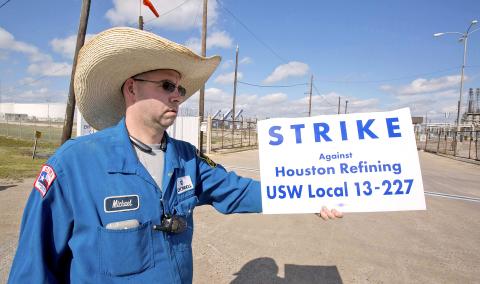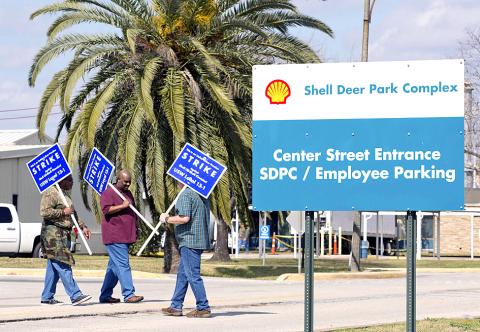The strike by oil workers at plants that account for 10 percent of US refining capacity entered its second day yesterday in the biggest walkout since 1980. Crude futures fell.
The United Steelworkers (USW) union that represents employees at more than 200 refineries, terminals, pipelines and chemical plants stopped work on Sunday at nine sites after failing to agree on a renewed labor contract. The union rejected five offers made by Royal Dutch Shell PLC on behalf of companies including ExxonMobil Corp and Chevron Corp since talks began on Jan. 21.
The USW has not called a strike nationally since 1980, when a stoppage lasted three months.

Photo: Reuters
While only one of the nine plants has curbed production amid the stoppage, a full walkout of USW workers would threaten to disrupt as much as 64 percent of US fuel output.
Shell and union officials began negotiations amid the biggest collapse in oil prices since 2008.
“If the strike escalates, that would be detrimental to the oil price,” David Lennox, a resource analyst at Fat Prophets in Sydney, said by telephone. “It will put high US production out on the market and there is nowhere for it to go.”

Photo: Reuters
US benchmark West Texas Intermediate oil fell as much as US$1.57 per barrel, or 3.3 percent, to US$46.67 in electronic trading on the New York Mercantile Exchange. It jumped 8.3 percent on Friday last week, the biggest one-day advance since June 2012.
Gasoline for March delivery slid US$0.233 per gallon, or 1.6 percent, to US$1.4555, and the diesel contract for the same month was US$0.189 lower at US$1.6819.
The refineries on strike can produce 1.82 million barrels of fuel per day, data compiled by Bloomberg show. They span the US, from Tesoro Corp’s plants in Martinez, California; Carson, California; and Anacortes, Washington; to Marathon Petroleum Corp’s Catlettsburg complex in Kentucky and three sites in Texas, according to the USW’s statement.
In Texas, Shell’s Deer Park complex, Marathon’s Galveston Bay plant and LyondellBasell Industries NV’s Houston facility have been affected, the union said. LyondellBasell activated its work continuation plan, spokesman George Smalley said on Sunday.
Tesoro will shut down remaining processing units at its Martinez, California, refinery in the next 24 hours, company spokeswoman Destin Singleton said in an e-mailed statement.
The 166,000 barrel-per-day refinery already had about half its capacity offline for planned maintenance, Singleton said.
More refineries are standing by to join the sites on strike, according to two people familiar with the plan who asked not to be identified because the information is not public.
Shell remained “committed to resolving our differences with USW at the negotiating table and hope to resume negotiations as early as possible,” Ray Fisher, a spokesman for The Hague-based company, said by e-mail on Saturday.

RECYCLE: Taiwan would aid manufacturers in refining rare earths from discarded appliances, which would fit the nation’s circular economy goals, minister Kung said Taiwan would work with the US and Japan on a proposed cooperation initiative in response to Beijing’s newly announced rare earth export curbs, Minister of Economic Affairs Kung Ming-hsin (龔明鑫) said yesterday. China last week announced new restrictions requiring companies to obtain export licenses if their products contain more than 0.1 percent of Chinese-origin rare earths by value. US Secretary of the Treasury Scott Bessent on Wednesday responded by saying that Beijing was “unreliable” in its rare earths exports, adding that the US would “neither be commanded, nor controlled” by China, several media outlets reported. Japanese Minister of Finance Katsunobu Kato yesterday also

China Airlines Ltd (CAL, 中華航空) said it expects peak season effects in the fourth quarter to continue to boost demand for passenger flights and cargo services, after reporting its second-highest-ever September sales on Monday. The carrier said it posted NT$15.88 billion (US$517 million) in consolidated sales last month, trailing only September last year’s NT$16.01 billion. Last month, CAL generated NT$8.77 billion from its passenger flights and NT$5.37 billion from cargo services, it said. In the first nine months of this year, the carrier posted NT$154.93 billion in cumulative sales, up 2.62 percent from a year earlier, marking the second-highest level for the January-September

‘DRAMATIC AND POSITIVE’: AI growth would be better than it previously forecast and would stay robust even if the Chinese market became inaccessible for customers, it said Taiwan Semiconductor Manufacturing Co (TSMC, 台積電) yesterday raised its full-year revenue growth outlook after posting record profit for last quarter, despite growing market concern about an artificial intelligence (AI) bubble. The company said it expects revenue to expand about 35 percent year-on-year, driven mainly by faster-than-expected demand for leading-edge chips for AI applications. The world’s biggest contract chipmaker in July projected that revenue this year would expand about 30 percent in US dollar terms. The company also slightly hiked its capital expenditure for this year to US$40 billion to US$42 billion, compared with US$38 billion to US$42 billion it set previously. “AI demand actually

Jensen Huang (黃仁勳), founder and CEO of US-based artificial intelligence chip designer Nvidia Corp and Taiwan Semiconductor Manufacturing Co (TSMC, 台積電) on Friday celebrated the first Nvidia Blackwell wafer produced on US soil. Huang visited TSMC’s advanced wafer fab in the US state of Arizona and joined the Taiwanese chipmaker’s executives to witness the efforts to “build the infrastructure that powers the world’s AI factories, right here in America,” Nvidia said in a statement. At the event, Huang joined Y.L. Wang (王英郎), vice president of operations at TSMC, in signing their names on the Blackwell wafer to